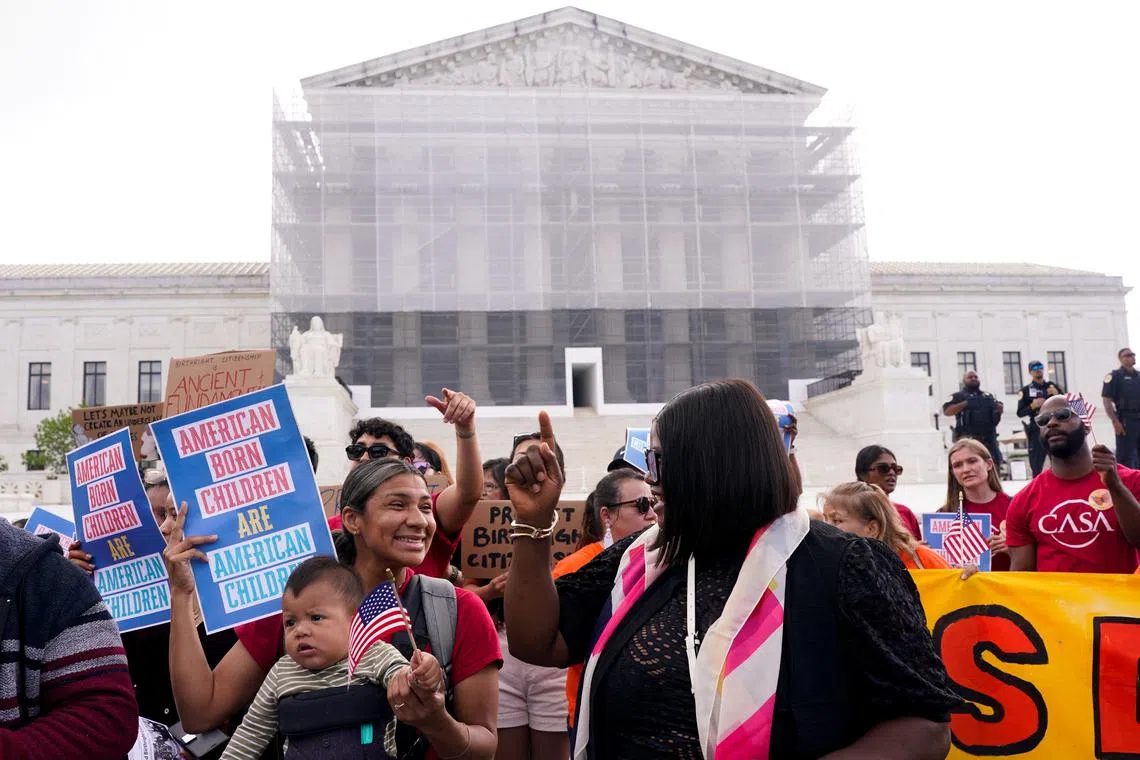Judge blocks Trump’s birthright citizenship order despite Supreme Court ruling
Sign up now: Get ST's newsletters delivered to your inbox

Demonstrators rallying on the day the Supreme Court justices heard oral arguments over US President Donald Trump's bid to enforce his executive order.
PHOTO: REUTERS
CONCORD, New Hampshire - A federal judge on July 10 has again barred the Trump administration from enforcing the US President’s executive order limiting birthright citizenship nationwide
US District Judge Joseph Laplante in Concord, New Hampshire, made the ruling after immigrant rights advocates implored him to grant class action status to a lawsuit they filed seeking to represent any babies whose citizenship status would be threatened by implementation of President Donald Trump’s directive.
Mr Laplante agreed the plaintiffs could proceed as a class, allowing him to issue a fresh judicial order blocking implementation of the Republican President’s policy nationally.
The question of whether to issue an injunction was “not a close call”, he said, noting that children could be deprived of US citizenship if Mr Trump’s order took effect.
“That’s irreparable harm, citizenship alone,” he said. “It is the greatest privilege that exists in the world.”
The judge said he would stay his ruling for a few days to allow the Trump administration to appeal and would issue a written decision by the end of the day.
The American Civil Liberties Union and others filed the suit just hours after the Supreme Court on June 27 issued a 6-3 ruling
Under the Supreme Court’s decision, Mr Trump’s executive order would take effect on July 27.
Looking to seize upon an exception in the Supreme Court’s ruling, the lawyers for the plaintiffs argued that the decision allows judges to continue to block Mr Trump policies on a nationwide basis in class action lawsuits.
The three judges who issued nationwide injunctions found that Mr Trump’s directive likely violates citizenship language in the US Constitution’s 14th Amendment.
The amendment states that all “persons born or naturalised in the United States, and subject to the jurisdiction thereof, are citizens of the United States and of the state wherein they reside”.
The Justice Department has argued that Mr Trump’s order conforms with the Constitution and has asked Judge Laplante to find that the plaintiffs cannot sue as a class.
The Supreme Court’s ruling did not address the legal merits of Mr Trump’s order, which the Republican President issued as part of his hardline immigration agenda on his first day back in office in January.
Mr Trump’s order directs federal agencies to refuse to recognise the citizenship of US-born children who do not have at least one parent who is an American citizen or lawful permanent resident, also known as a “green card” holder.
More than 150,000 newborns would be denied citizenship annually if it takes effect nationally, according to Democratic-led states and immigrant rights advocates who have challenged it. REUTERS


